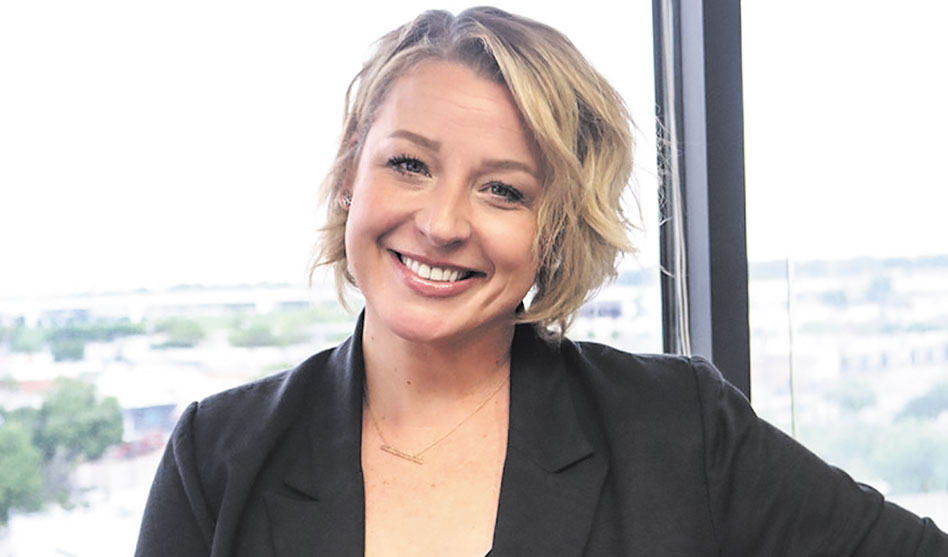Michelle Moos
Michelle Moos takes the reins at longtime HIV agency and hopes to expand agency’s reach
DAVID TAFFET | Senior Staff Writer
taffet@dallasvoice.com
Legal Hospice of Texas Executive Director Michelle Moos said she took the position as director of the agency partly because she saw it as an opportunity to reinvent how the organization is seen in the community. And while certain funding sources restrict where LHT can offer its services, “Nobody else is doing what we do,” she said.
Legal Hospice has been helping people with HIV with legal problems — such as obtaining social security disability, evictions and discrimination — since 1989. That mission has been expanded to helping not just those with HIV, but people with terminal illnesses, also. Those conditions include Alzheimer’s, Parkinson’s, ALS, muscular dystrophy, multiple sclerosis and some cancers.
Last year, after Tony Lokash left his position as the agency’s executive director, longtime employee Pete Flores returned as interim ED. After 17 years with LHT, Flores had left to go to law school. He took on the interim executive director job after graduating but before taking his bar exam, eventually leaving at the end of last year to study full time for the bar.
“He was an integral part of me staying,” said Moos, who was convinced by the board to take the reins from Flores.
After a few months on the job, Moos said she is looking to expand the agency’s reach by looking for new funding, new volunteer attorneys and new ways to help. She said she’s looking for an answer to the question, “What else can we be doing?”
Moos is results oriented. “We just don’t let files sit,” she said.
That’s the way LHT has operated since it was founded.
There was an annual conference at SMU that examined ethical issues of concern to the practice of law, medicine and theology, and, in 1988, the conference focused on AIDS. Dallas Legal Hospice grew out of that conference, focusing on ways to help people with HIV with their legal documents.
Louis Weber, Carolyn Gilbert and Thomas Mayo, the founders of what has since become Legal Hospice of Texas, approached William Waybourn at Dallas Gay and Lesbian Alliance about adding pro bono legal services to the resources available at the AIDS Resource Center on Cedar Springs Road. Members of the Dallas Young Lawyers Association began volunteering on some of the tougher cases. And by September 1989, Dallas Legal Hospice officially became a nonprofit law firm mostly helping people living with AIDS with wills and powers of attorney.
Attorneys in private practice or on the faculty of SMU School of Law who volunteered with the organization at the time were risking their careers — not just because of the stigma attached to AIDS, but also because those affected by the disease were mostly gay men, which carried its own load of stigma.
But rather than give in to the stigma and leave these people with AIDS to sit on a waiting list for pro bono services, volunteer attorneys would set up tables at Resource Center a couple of nights a month to write wills and create other necessary legal for them.
There was urgency to their work, because they knew many of their clients weren’t going to live much longer.
Moos said she is bringing some of that urgency back to the organization.
She doesn’t have the traditional background for running an HIV or a legal nonprofit. Instead, she began her professional career in Dallas at the Meadows Foundation, starting in events and facilities and working her way up to become “director of fun.”
She then became operations manager for PRA, a leading global event planning operation. Later, she managed all corporate and incentive travel for United Healthcare.
After making several other corporate stops along the way and gaining 100 pounds, Moos decided to take better care of herself by, among other things, helping to found the volleyball team at UT Dallas.
“I began working here” at Legal Hospice and found a place that was caring and compassionate, she said: “We see a problem. We find a solution” — even if that solution is nothing more than waiting on line on eternal hold for a client.
At one time, when someone with HIV applied for disability, it was automatically approved. Now it’s almost automatically denied on first application.
And yet, despite the success of HIV meds in many cases, some people with HIV can’t work, at least not full time. A call from an attorney after their disability claim is denied may be more effective than re-applying on their own, but because hold times are so long, most people just give up.
“Our attorneys are on hold for hours,” Moos said, but they generally get positive results.
Moos said 90 percent of the 400 cases Legal Hospice handled last year were HIV-related and came from within a 16-county region in North Texas. Moos said she wants to find volunteer attorneys in each of those counties — and beyond — to handle even more cases in an even wider area.
Because the rules for current funding restrict the areas Legal Hospice can serve, Moos said she is actively looking for additional grants that will allow her agency to help more people.
But, she postulated, what if someone from Waco is in Dallas for a medical procedure? If they need some legal assistance while they are here, should Legal Hospice have to turn them down just because they don’t live in a specific county, or be forced to refer them to a local legal aid organization, leaving someone with a terminal illness on a one- or two-month wait list?
Moos doesn’t think so.
After all, she said, there’s a reason her agency changed its name from Dallas Legal Hospice to Legal Hospice of Texas: It’s to help people throughout the state.

